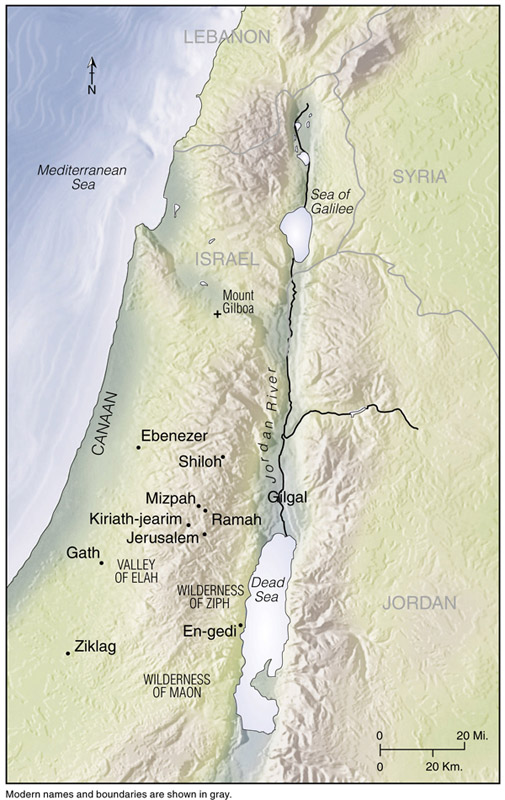KEY PLACES IN 1 SAMUEL

1 Ramah Samuel was born in Ramah. Before his birth, Samuel’s mother, Hannah, made a promise to God that she would dedicate her son to serve God alongside the priests in the Tabernacle at Shiloh (1:1—2:11).
2 Shiloh The focal point of Israel’s worship was at Shiloh, where the Tabernacle and the Ark of the Covenant resided. Eli was the high priest, but his sons, Hophni and Phinehas, were evil men who took advantage of the people. Samuel, however, served God faithfully, and God blessed him as he grew (2:12—3:21).
3 Kiriath-jearim (Kirjath-jearim) Israel was constantly at odds with the Philistines, and another battle was brewing. Hophni and Phinehas brought the Ark of the Covenant from Shiloh to the battlefield, believing that its mere presence would bring the Israelites victory. The Israelites were defeated by the Philistines at Ebenezer, and the Ark was captured. However, the Philistines soon found out that the Ark was not quite the great battle trophy they expected. For God sent plagues upon every Philistine city into which the Ark was brought. Finally, the Philistines sent it back to Kirjath-jearim in Israel (4:1—7:1).
4 Mizpah (Mizpeh) The Israelites’ defeat made them realize that God was no longer blessing them. Samuel called the people together at Mizpeh and asked them to fast and pray in sorrow for their sins. The assembly at Mizpeh was a tempting target for the confident Philistines who advanced for an attack. But God intervened and routed their mighty army. Meanwhile, Samuel was judging cases throughout Israel. But as Samuel grew old, the people came to him at Ramah (his home base) demanding a king in order to be like the other nations. At Mizpeh, Saul was chosen by sacred lot to be Israel’s first king with the blessing, but not the approval, of God and Samuel (7:2—10:27).
5 Gilgal A battle with the Ammonites proved Saul’s leadership abilities to the people of Israel. He protected the people of Jabesh-gilead and scattered the Ammonite army. Samuel and the people crowned Saul as king of Israel at Gilgal (11:1–15).
6 Valley of Elah Saul won many other battles, but over time he proved to be arrogant, sinful, and rebellious, so God finally rejected him as king. Unknown to Saul, a young shepherd and musician named David was anointed to be Israel’s next king. But it would be many years before David sat upon the throne. Ironically, Saul hired David to play the harp in his palace. Saul grew to like David so much that he made him his personal bodyguard. In one particular battle with the Philistines in the valley of Elah, David killed Goliath, the Philistines’ mightiest soldier. But this victory was the beginning of the end of Saul’s love for David. The Israelites praised David more than Saul, causing Saul to become so jealous that he plotted to kill David (12:1—22:23).
7 The Wilderness Even anointed kings are not exempt from troubles. David literally ran for his life from King Saul, hiding with his band of followers in the wilderness of Ziph (where the men of Ziph constantly betrayed him), the wilderness of Maon, and the caves of En-gedi. Though he had opportunities to kill Saul, David refused to do so because Saul was God’s anointed king (23:1—26:25).
8 Gath David moved his men and family to Gath, the Philistine city where King Achish lived. Saul then stopped chasing him. The Philistines seemed to welcome this famous fugitive from Israel (27:1–4).
9 Ziklag Desiring privacy in return for his pretended loyalty to King Achish, David asked for a city in which to house his men and family. Achish gave him Ziklag. From there David conducted raids against the cities of the Geshurites, Girzites (Gerzites), and Amalekites, making sure no one escaped to tell the tale (27:5–12). David later conquered the Amalekites after they raided Ziklag (30:1–31).
10 Mount Gilboa War with the Philistines broke out again in the north, near Mount Gilboa. Saul, who no longer relied on God, consulted a witch in a desperate attempt to contact Samuel for help. In the meantime, David was sent back to Ziklag because the Philistine commanders did not trust his loyalty in battle against Israel. The Philistines slaughtered the Israelites on Mount Gilboa, killing King Saul and his three sons, including David’s loyal friend Jonathan. Without God, Saul led a bitter and misguided life. The consequences of his sinful actions affected not only him but hurt his family and the entire nation as well (28:1—31:13).